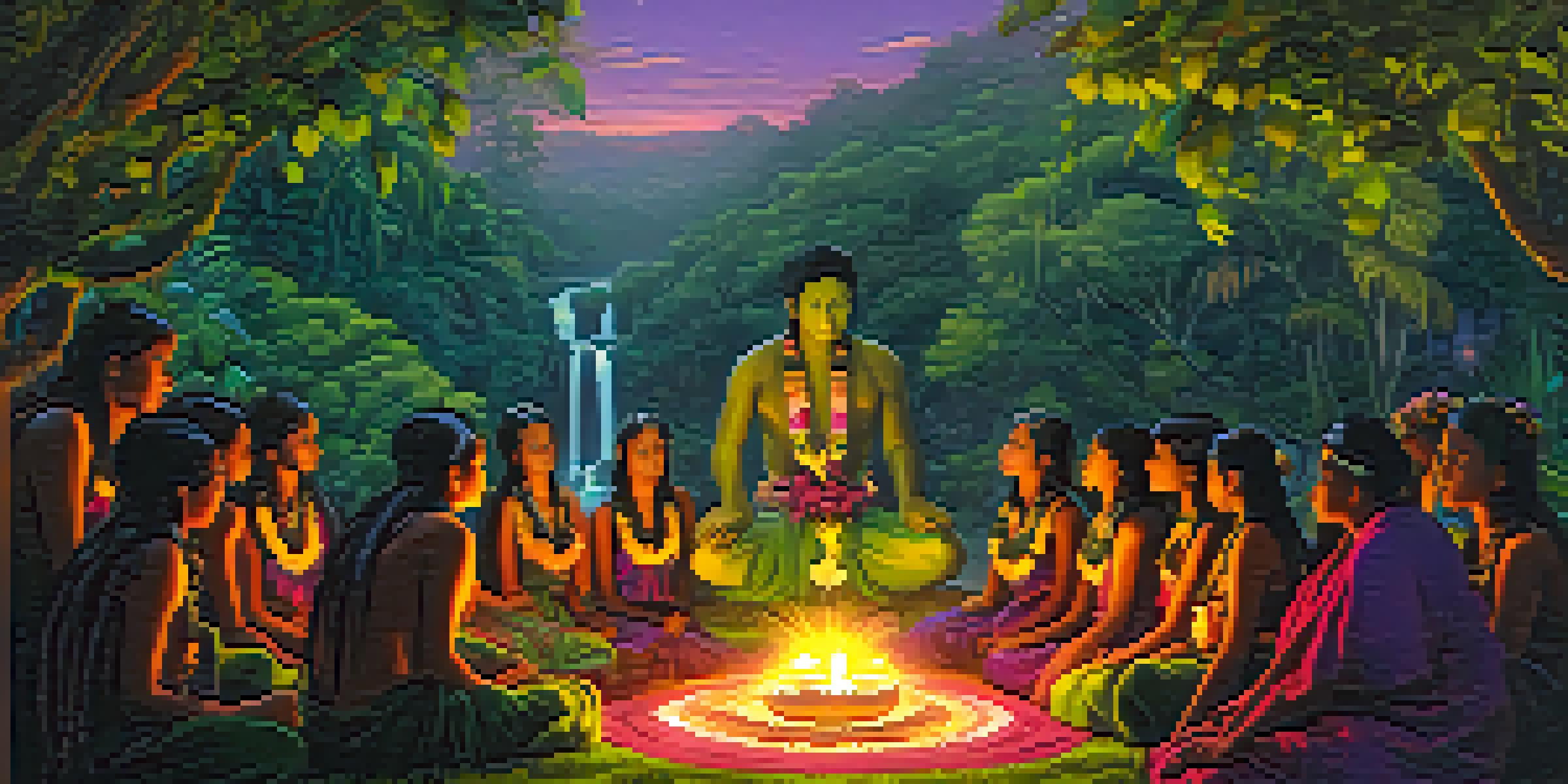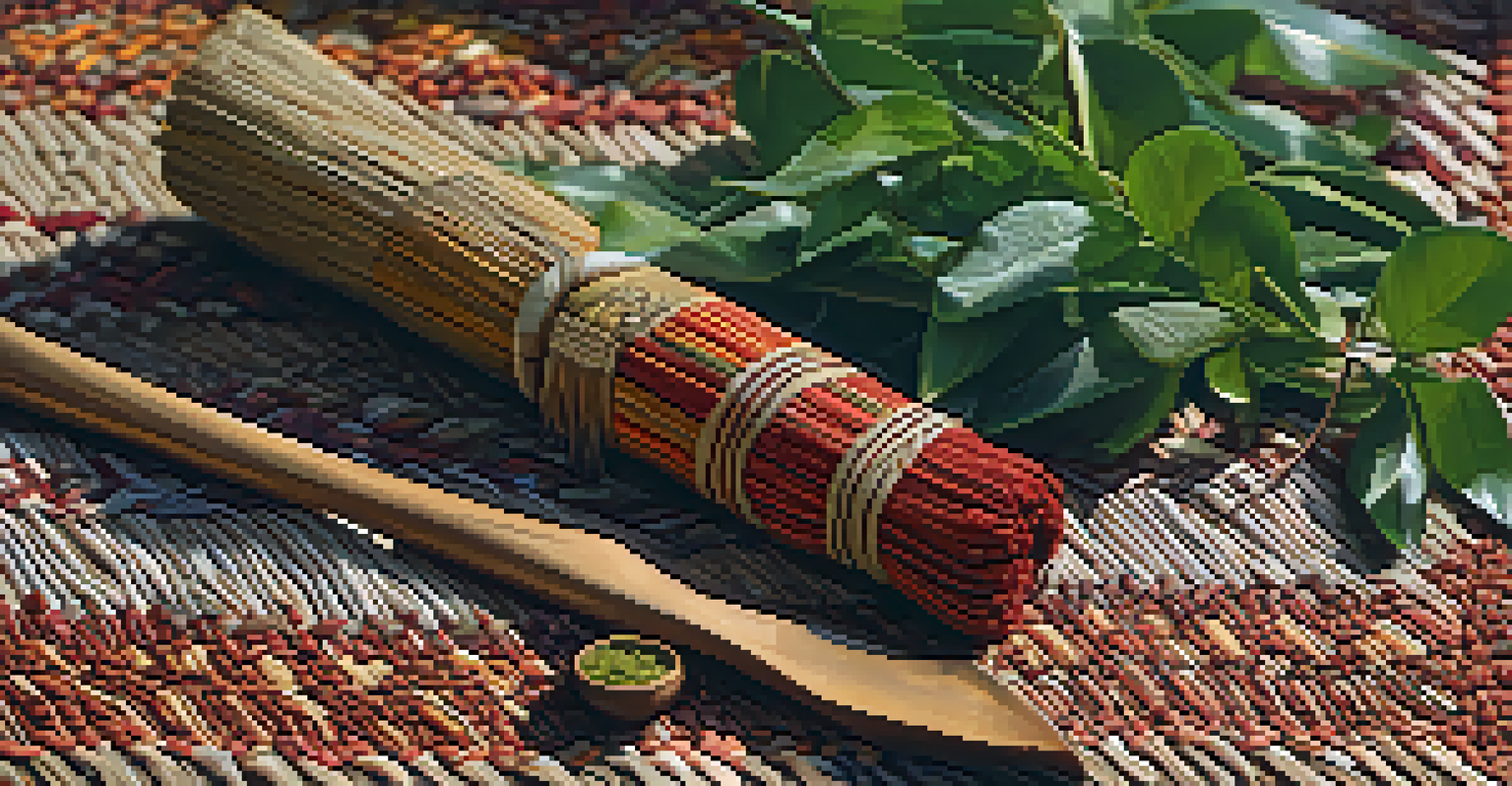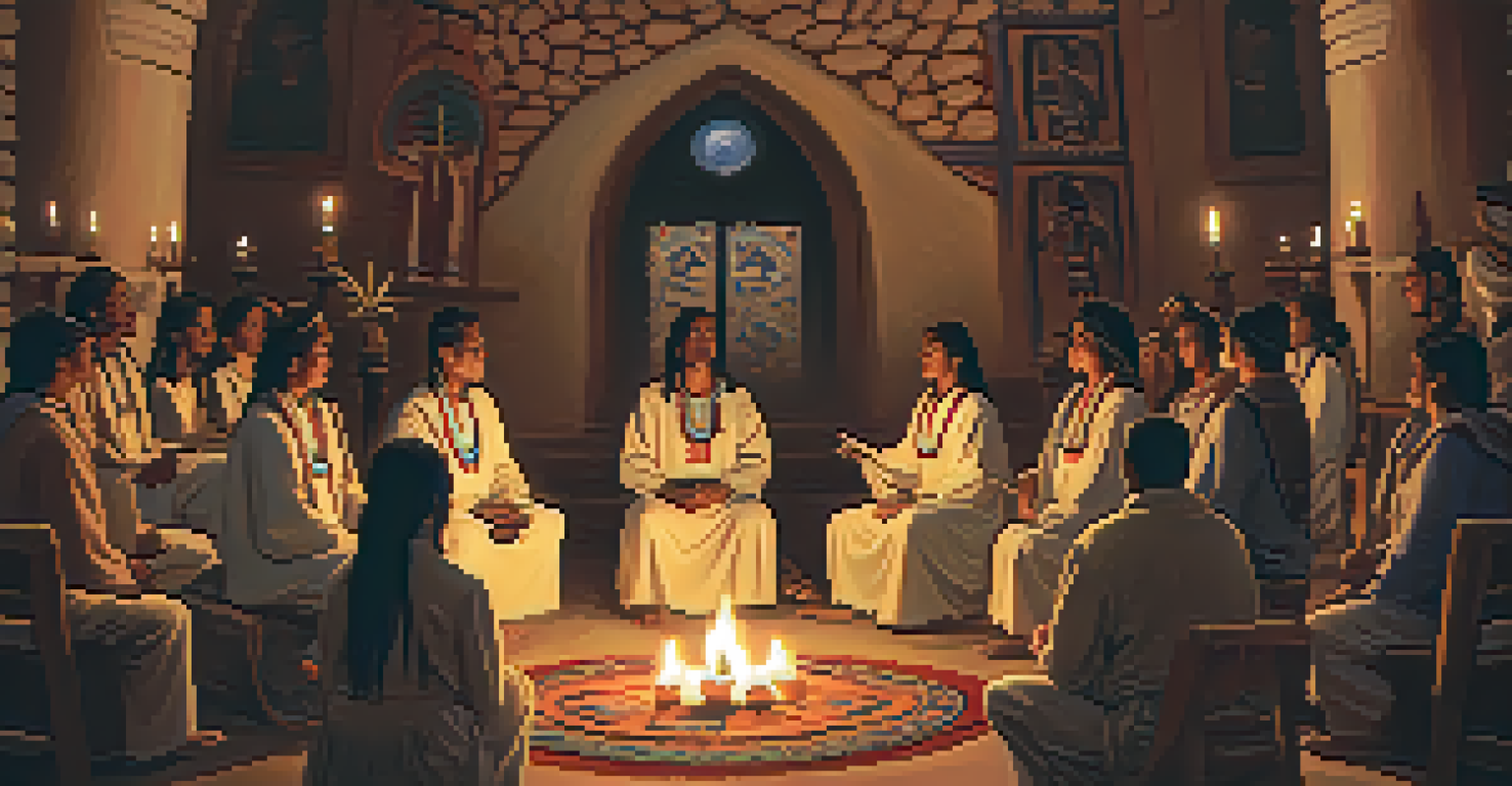Cultural Significance of Psychedelics in Indigenous Communities

Understanding the Role of Psychedelics in Indigenous Traditions
Psychedelics have been integral to various Indigenous communities for centuries, serving as tools for spiritual connection and healing. These substances, often derived from natural sources like plants and fungi, are woven into the fabric of rituals and ceremonies. They enable participants to explore their consciousness, gain insights, and connect with their ancestors and the natural world. This profound relationship highlights the importance of these substances beyond mere recreation, emphasizing their cultural and spiritual value.
The use of psychedelics in Indigenous cultures emphasizes the importance of community and tradition in the healing process.
In many Indigenous cultures, the use of psychedelics is accompanied by specific rituals and guidance from experienced practitioners. This sacred context transforms the experience into a communal event, fostering a sense of belonging and shared understanding. For instance, in the Amazon, the use of ayahuasca is not just about the substance itself, but the journey it facilitates within a supportive community. Such practices underscore the belief that healing and enlightenment are best achieved collectively.
Ultimately, the cultural significance of psychedelics in Indigenous communities reveals a deep reverence for nature and the unseen realms. Through these practices, individuals often find clarity and purpose, reinforcing cultural identities and traditions. This relationship challenges the modern perception of psychedelics, inviting a broader understanding of their potential benefits when approached with respect and intention.
Psychedelics as Tools for Healing and Spiritual Growth
Many Indigenous communities view psychedelics as powerful tools for healing, both physically and spiritually. The use of these substances can help individuals confront personal traumas, leading to transformative experiences that promote emotional well-being. For example, the Mazatec people in Mexico use psilocybin mushrooms in healing ceremonies, allowing participants to navigate complex emotional landscapes with the guidance of a shaman. This approach emphasizes the therapeutic potential inherent in these sacred practices.

Moreover, the process often includes elements of storytelling and sharing, fostering a sense of community among participants. This communal aspect enhances the healing experience, as individuals are supported by their peers and cultural narratives. In many cases, the act of sharing one's journey becomes a vital part of the healing process, reinforcing bonds and collective resilience. Such practices highlight the interconnectedness of personal and communal well-being.
Psychedelics in Indigenous Healing
Indigenous communities use psychedelics as powerful tools for healing and spiritual growth, emphasizing communal support and traditional practices.
As modern society begins to recognize the therapeutic potential of psychedelics, there's a growing interest in integrating these ancient practices into contemporary healing modalities. This fusion of traditional wisdom with modern science could create profound opportunities for healing and understanding. However, it is essential to approach this integration with respect for Indigenous traditions and knowledge, ensuring that cultural practices are honored rather than appropriated.
Rituals and Ceremonies Surrounding Psychedelic Use
Rituals and ceremonies play a crucial role in the use of psychedelics within Indigenous communities. These practices often incorporate music, dance, and sacred objects, creating an immersive environment that enhances the psychedelic experience. For instance, in the Native American Church, peyote ceremonies involve specific prayers, songs, and rituals that guide participants through their journey. This structured approach helps individuals navigate their experiences safely and meaningfully.
Respecting Indigenous knowledge is essential in ensuring that the cultural significance of psychedelics is honored, rather than exploited.
The intention behind these rituals is to create a sacred space where participants can connect with the divine and explore their inner selves. By setting clear intentions, individuals are encouraged to seek understanding, healing, and insight during their experiences. This sacred context fosters a sense of trust and safety, allowing participants to delve deeper into their consciousness without fear. The communal support offered during these rituals further reinforces this sense of security.
Additionally, these ceremonies often emphasize the importance of reciprocity with nature. Participants learn to honor the plants and the land, understanding that their relationship with the natural world is vital to their spiritual practices. This connection cultivates a sense of responsibility towards the environment, promoting sustainable practices and respect for all living beings.
The Interplay Between Psychedelics and Indigenous Identity
Psychedelics are not only tools for healing but also play a significant role in shaping Indigenous identity. The practices surrounding these substances are deeply embedded in cultural narratives, reinforcing a sense of belonging and community. For many Indigenous peoples, engaging with psychedelics is a way to connect with their heritage, preserving traditional knowledge and practices for future generations. This connection to identity is vital in a world where many Indigenous communities face the challenges of cultural erosion.
In this context, psychedelics serve as a bridge between the past and the present, allowing individuals to engage with their ancestors' wisdom. Through these experiences, people often gain insights into their cultural history, strengthening their ties to their community and traditions. This aspect of psychedelic use highlights the importance of cultural continuity and the role of these practices in maintaining a vibrant cultural identity.
Cultural Significance of Psychedelics
Psychedelics are deeply woven into Indigenous identity, reinforcing cultural narratives and fostering a connection to heritage.
Furthermore, as Indigenous communities navigate the complexities of modernity, the use of psychedelics can foster resilience and adaptability. By reconnecting with their roots, individuals can draw strength from their cultural heritage, empowering them to face contemporary challenges. This interplay between psychedelics and identity underscores the profound impact these practices have on personal and collective narratives.
Contemporary Perspectives on Indigenous Psychedelic Practices
As interest in psychedelics grows globally, Indigenous communities find themselves at a crossroads. Many are reclaiming their traditional practices and asserting their rights to use these substances in their spiritual and healing ceremonies. This resurgence is often met with a mix of excitement and concern, as the potential for cultural appropriation looms large. Indigenous leaders emphasize the need for understanding and respect when it comes to their sacred practices.
In contemporary settings, some Indigenous groups are also exploring partnerships with researchers and practitioners in the field of psychedelics. This collaboration can lead to valuable insights into the therapeutic potential of these substances while ensuring that Indigenous knowledge is respected and valued. By sharing their wisdom, Indigenous communities can play a pivotal role in shaping the future of psychedelic research and practice.
However, it is crucial to navigate these relationships with care. The commodification of Indigenous practices can lead to exploitation, undermining the very cultural significance that makes these experiences meaningful. Safeguarding Indigenous intellectual property and ensuring equitable partnerships are vital steps toward honoring the rich heritage and knowledge that these communities possess.
Challenges and Ethical Considerations in Psychedelic Research
The increasing interest in psychedelics also brings forth several challenges and ethical considerations, particularly regarding Indigenous knowledge. As researchers explore the therapeutic potentials of these substances, there is a risk of extracting knowledge from Indigenous communities without proper acknowledgment or benefit. This practice can lead to a form of exploitation, where the cultural significance of psychedelics is overshadowed by commercial interests.
Moreover, the historical context of colonization adds another layer of complexity to these discussions. Many Indigenous communities have faced systemic oppression, leading to a deep mistrust of outside entities. Building genuine relationships based on mutual respect and understanding is essential for fostering collaboration in psychedelic research. Acknowledging the historical injustices faced by these communities is a crucial step in establishing trust.
Ethical Considerations in Research
As interest in psychedelics grows, ethical concerns arise regarding the exploitation of Indigenous knowledge and the need for respectful collaboration in research.
Ethical considerations also extend to how research findings are disseminated and utilized. It is important to ensure that Indigenous voices are included in conversations about the future of psychedelics, shaping the narrative around their use. By prioritizing equity and respect, researchers can help create a framework that honors the cultural significance of psychedelics while exploring their benefits for broader society.
The Future of Psychedelics in Indigenous Practices
Looking ahead, the future of psychedelics in Indigenous practices appears to be a blend of tradition and innovation. As more people recognize the value of these substances, Indigenous communities have the opportunity to reclaim and revitalize their cultural practices. This resurgence can lead to a renewed interest in traditional knowledge, fostering a sense of pride and ownership among community members. By embracing both ancient wisdom and modern insights, these communities can navigate the complexities of the contemporary world.
Additionally, as research on psychedelics continues to evolve, there may be increased opportunities for collaboration between Indigenous practitioners and scientists. This partnership can lead to a deeper understanding of the therapeutic potential of psychedelics while ensuring that Indigenous knowledge is properly respected. By working together, both sides can contribute to a more comprehensive understanding of these substances and their impact on human health and well-being.

However, it remains essential to approach this future with caution and respect. Ensuring that Indigenous voices lead the conversation around their practices is crucial for preserving cultural integrity. By honoring the traditions and knowledge of these communities, we can create a future where psychedelics are used responsibly and meaningfully in both Indigenous and broader contexts.